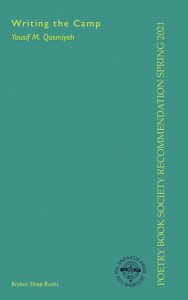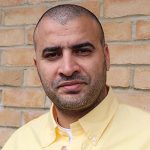Writing the Camp

Author: Yousif M. Qasmiyeh
Publisher: Broken Sleep Books
Year of Publication: 2021
Print Length: 120 pages
Genre: Poetry, Autobiography or Memoir
Area: Baddawi Refugee Camp, Lebanon
Topic: Asylum & Asylum Seekers, Refugees & Forced Migration, Asylum & Refugee System, Camps, Lived Experience, Reflection, Existentialism, Philosophy, Poetics, Humanity; Modernity, Modernism, Modern; Poetry
SHORTLISTED FOR 2022 ROYAL SOCIETY OF LITERATURE ONDAATJE PRIZE
POETRY BOOK SOCIETY SPRING 2021 RECOMMENDATION
ONE OF THE DAILY TELEGRAPH’S BEST POETRY BOOKS 2021
Yousif M Qasmiyeh’s Writing The Camp is an exceptional, essential collection drawn from the poet’s experience of the Baddawi refugee camp in Lebanon. The poetry moves beyond the observational into a philosophical meditation on the existential nature of place. Qasmiyeh asks “Where is time?”, crossing footprints of Derrida, “To experience is to advance by navigating, to walk by traversing”. Writing The Camp is a brave and beautiful work, one which will surely be of historical importance.
“Yousif M. Qasmiyeh’s Writing the Camp is a book with which every reader needs to be in dialogue, carrying it in their heart or on their back as a perpetual interlocutor. Qasmiyeh’s vast and cohesive philosophy of being, time, encounter, and place answers and displaces more comfortably established thinkers. Grounded in the exact and intimate knowledge of the camp, these writings acknowledge and refuse to rest with anguish or particularity, the archive or the universal. The fragment always has the integrity of the sequence. Here is dwelling, questioning, and life. This is what we have to consider if we are considering humanity, or modernity. This is a book to love.” – Anthony Vahni Capildeo
Table of Contents
- In arrival, feet flutter like dying birds
- Contamination
- Foreigners
- My mother the philosopher
- Mother
- He
- Invasion
- Attachment
- Thresholds
- Anthropologists
- Function of inhabiting
- The dinghy
- Past tense
- Non-arrival
- If this is my face, so be it
- At the feast of asylum
- Fingerprinting
- Her name
- My mother’s feet
- The camp—is it possible?
- Photographs
- Single life
- A soliloquy before time
- Time
- Writing the camp
- Refugees are dialectical beings
- The camp is time
- The camp is the reject of the reject par excellence
- The mourning the refugee, we mourn God’s intention in the absolute
- A sudden utterance is the strange
- Confessions
- What remains of the camp when the name dies?
- There it is: the camp that is yet to be born
- Necessarily, the camp is the border
- Flesh when mutilated called God
- The bomb shelter
- A fistful of solitude
- Is it distance or is it a far god?
- An infinite outing; or the cemetery
- Sensitivity
- Imbalance
- Seeing
- Dialects
- Face
- The throne
- It is a camp despite the name
- With a third eye, I see the catastrophe
Acknowledgements

Yousif M. Qasmiyeh Born and educated in Baddawi refugee camp. He is a poet and translator whose doctoral research at the University of Oxford examines containment and the archive in ‘refugee writing’. Time, the body, and ruination inform his poetry and prose, which have appeared in journals including Modern Poetry in Translation, Stand, Critical Quarterly, GeoHumanities, Cambridge Literary Review, PN Review, Poetry London and New England Review. He is the Arabic language researcher on the Prismatic Translation strand of the OWRI-funded Creative Multilingualism project, Writer-in-Residence for the AHRC-ESRC funded Refugee Hosts research project, the ‘Creative Encounters’ editor for the Migration and Society journal, and Joint Lead of the Imagining Futures Baddawi Camp Lab funded by the AHRC-GCRF. His collection, Writing the Camp (Broken Sleep Books, 2021) was a Poetry Book Society Recommendation, and was shortlisted for the Royal Society of Literature’s Ondaatje Prize.
Source: https://www.brokensleepbooks.com/product-page/yousif-m-qasmiyeh-writing-the-camp & https://www.english.ox.ac.uk/people/yousif-qasmiyeh
More from Yousif M. Qasmiyeh in this library, click here.
